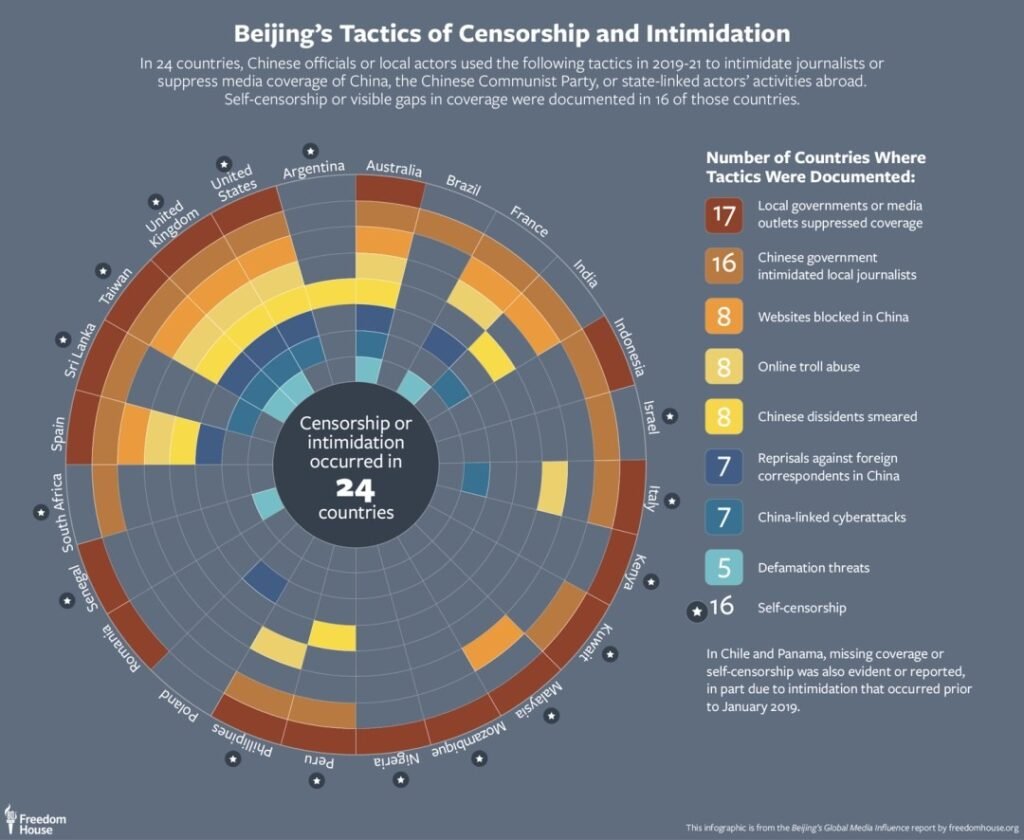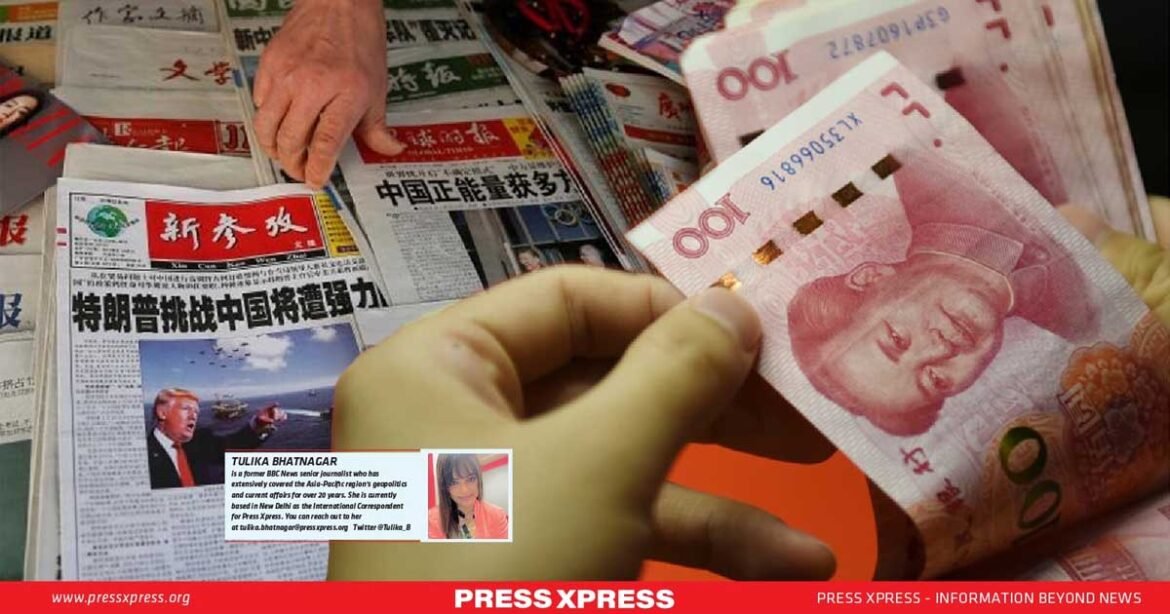In an extensive raid under the stringent anti-terror law, police in India are investigating China links into the funding of news website NewsClick – a charge it denies.
NewsClick, known to be severely critical of the Indian government, was also recently listed in a US report that said it received millions in funding to push the narrative favoured by the Chinese media and government.
Analysing pro-China narrative claims
A search on the NewsClick website for China-related articles does throw up results that are subtly in favour of the Chinese narrative.
For example, under a seemingly neutral title “Big picture of disengagement in Ladakh” published in 2022, the article warns India of daunting challenges, “stemming from the West’s attempts to polarise the world community against Russia and China.”
Most articles follow a similar strategy – stating facts to establish a neutral stance and combining them with pieces of text to present a pro-China angle.
In another piece, published in February 2023, after the controversial BBC documentary “The Modi Question” was released, the website calls the ruling Bharatiya Janata Party’s reaction to the documentary as “nauseating”.
“India is not a superpower against whom international conspiracies are hatched,” the article states.
Then it goes on to give a lengthy explanation – interspersed with numbers and figures and even criticising the IMF growth projection of India – to point out that India “has a long way to go before even becoming the most powerful nation in Asia”.
In another piece about the recently held G20 summit in New Delhi, the website claims there was “tom-tomming” that G20 was a “success”.
“Delhi is wrong to assume it is a Pied Piper,” the article states.
It ends by claiming that once all G20 leaders go away from the Indian soil, Delhi would “revert to its China-centric foreign policies”.

Analysing foreign funding claims
NewsClick was founded in 2009 by Prabir Purkayastha, an engineer and a science activist.
Police authorities claim that Purkayastha was part of a global network that received funding from American millionaire Neville Roy Singham, who has close ties with China.
Singham is known to be a Maoist activist and, while spending his early life in the United States, is now based out of China’s Shanghai. He has business interests in Chinese companies and in July 2023, is known to have attended a Chinese government workshop about international promotion of the Chinese Communist Party.
In 2021, India’s enforcement directorate (ED) named Singham in a money laundering case, alleging he gave $380 million to Indian news portal People’s Dispatch (owned and maintained by NewsClick) to promote pro-China narrative.
Last year, a US-based think tank also alleged that Singham spent nearly $65 million on a network of non-profits, influencing them to deny any anti-China narrative around Xinjiang – the notorious region in China accused of crimes against humanity against the local Uighur population and mostly Muslim ethnic groups.
Last month, an investigative report by American news media, The New York Times, again named Singham as donating millions across the world to spread pro-Chinese government messages.
Purkayastha’s NewsClick was one such entity that received some part of those millions. “It has sprinkled its coverage with Chinese government talking points,” the report said.
NewsClick apparently received more than $4 million in foreign funding over a period of three years, according to media reports. A part of these funds was furthered to over 200 prominent freelancers, authors, activists, and journalists known for their criticism of the Modi government.
According to ED, Puryakastha knew Singham since 2017. Till 2018, NewsClick was a loss-making company. In April of 2018, the news website apparently got a $1 million foreign direct investment through subscription of its shares, from a non-existent company.
The police are still investigating the depths and channels of the funding network and haven’t given out any official comment yet. But local reports do mention that an investigation of email correspondences has revealed that communication between NewsClick and Singham revolved around the themes of propagating Chinese narrative, as well as justifying confrontations at the Indo-China border.
China vs the Western narrative
Beijing is spending billions of dollars every year to shape perceptions of China through influence, censorship, and disinformation, the United States has said. What is wrong with that, one may wonder. Except that the methods deployed are “coercive and deceptive”, according to the US State Department.
If left unchecked, China’s large-scale campaign will “reshape the global information landscape, creating biases and gaps” and even leading nations to “make decisions that subordinate their economic and security interests to Beijing”, it said in a Global Engagement Centre report.
So how has Beijing stepped up this influence campaign?
For one, social media platforms have played a big role in pushing the pro-China narrative on hot button issues such as Xinjiang, the South China Sea, Hong Kong, and Taiwan.
As of 2021, almost 100 influencers were paid to spread official Chinese messaging in at least two dozen languages to a combined user base of almost 11 million people, according to the report.
The report also mentions that China’s outreach programmes include spending a large amount of money on reporters from varied countries such as the Saudi Arabia, Malaysia, the Philippines, etc. and taking them to the country – such as the Xinjiang region – for pre-organised tours of “the truth”, which seek to negate the Western narrative.
The news media is generally seen as a source through which people consume information.
But for Beijing, “it the main conduit in its battle for hearts and minds”, says Harsh Pant, Vice President – Studies and Foreign Policy at Observer Research Foundation, New Delhi.
In East Africa for example, the Chinese regime paid a newspaper to publish favourable news items, which were presented as independent reportage.
“Through technology, economic statecraft, and wolf warrior diplomats, China is shaping a narrative in India and elsewhere that sees the world through its prism,” adds Pant.
A 2022 report by US-based think tank Freedom House, called Beijing’s Global Media Influence, examines how the Chinese government has expanded its global media footprint.
It notes that in 18 of the 30 countries examined in this study, the Chinese regime’s efforts increased over the course of three years (2019-21).
The study has raised the important question of how Beijing’s efforts to fund and manipulate foreign media will impact the health of global democracy in the future.
So far, it hasn’t resulted in pro-China narrative dominating the coverage in countries across the world. But, in the long term, it continues to be a significant factor in changing the global media narratives away from the Western narrative.
For now, the NewsClick raid has reminded countries around the world of how deep and silent this network runs, funding foreign media and pushing its own agenda in the name of independent and free press.


